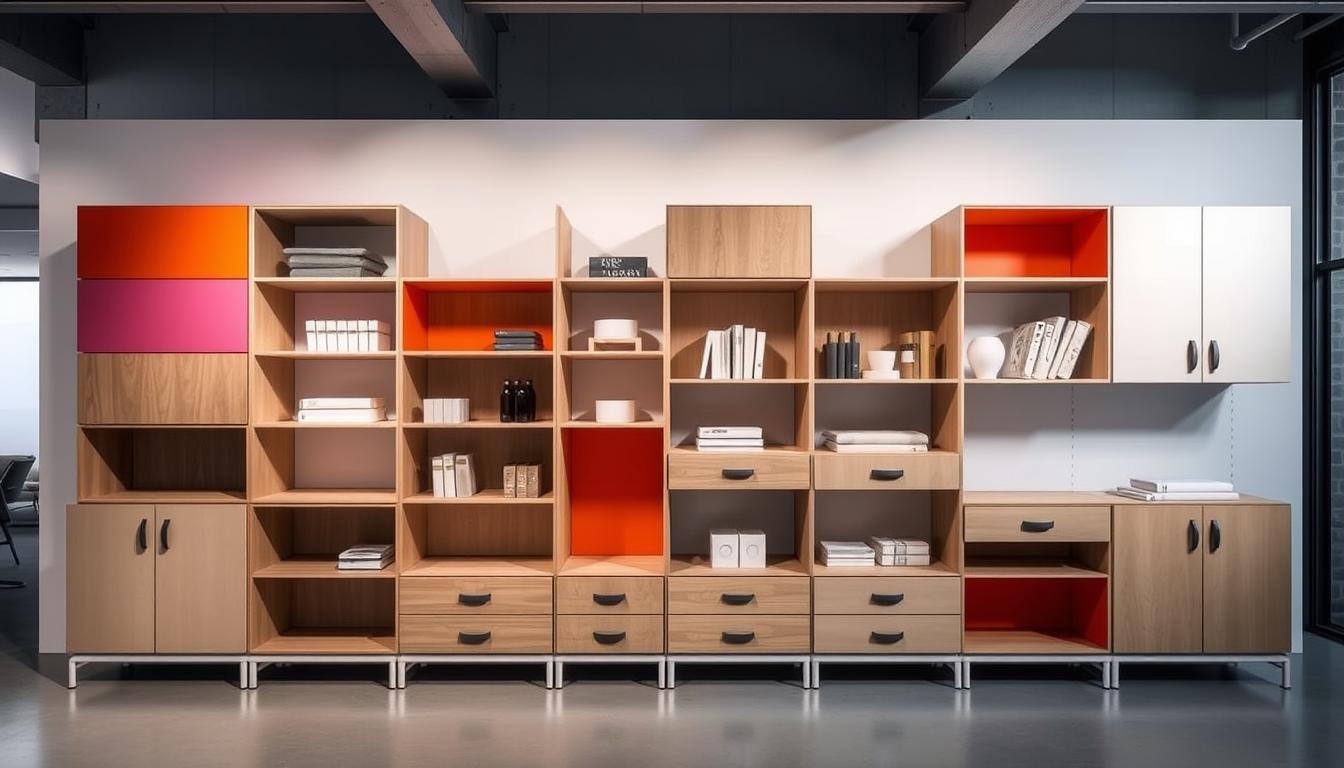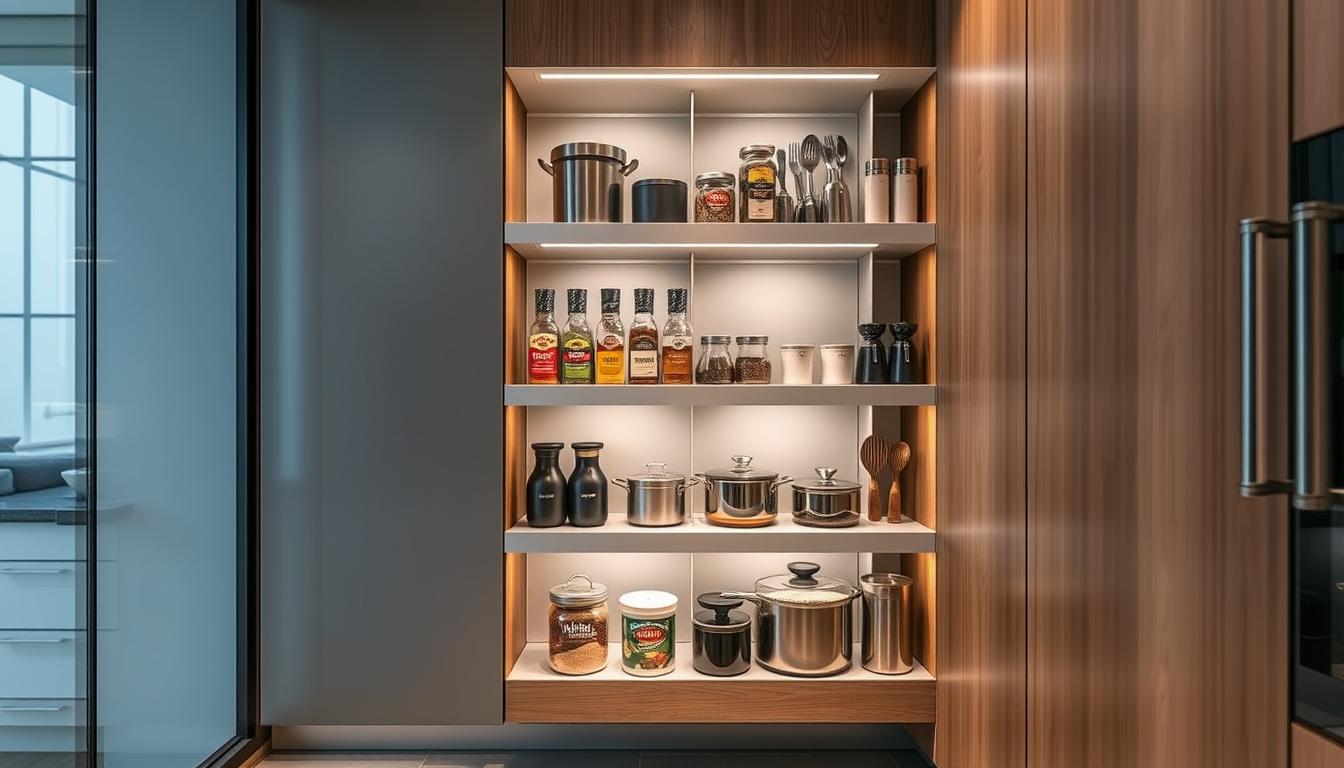Modular storage systems are designed to offer flexibility and adaptability in storage solutions. They are perfect for individuals, businesses, and organizations with evolving needs. These systems consist of adjustable components that can be customized to meet specific requirements. They provide scalability, ease of installation, and cost-effectiveness.
Modular storage is ideal for various applications, from residential to commercial use. Its ability to be tailored to fit different spaces and requirements makes it versatile. This adaptability is crucial in today’s dynamic environments, where storage needs can change rapidly.
With modular storage, users can enjoy the benefits of adjustable systems. These allow them to reconfigure and expand their storage solutions as needed. This flexibility is invaluable in today’s fast-paced world, where storage needs can shift quickly. Modular storage systems offer a practical and efficient solution, enabling users to maximize their space and minimize waste.
Key Takeaways
- Modular storage systems provide flexibility and adaptability in storage solutions
- Adjustable systems can be customized to meet specific requirements
- Modular storage offers scalability, ease of installation, and cost-effectiveness
- These systems can be tailored to fit different spaces and requirements
- Modular storage is suitable for a wide range of applications, from residential to commercial use
- Adjustable systems allow users to reconfigure and expand their storage solutions as needed
Understanding Modular Storage: The Foundation of Flexible Organization
Modular storage systems have gained popularity for their flexible organization capabilities. They offer adaptable storage units that can be rearranged as needs evolve. These systems feature a modular design, ease of reconfiguration, and a wide range of materials.
The evolution of storage solutions has led to modular systems, offering a more efficient way to organize space. Key benefits include:
- Easy reconfiguration to meet changing needs
- Variety of materials and designs to choose from
- Space optimization to maximize storage capacity
Modular storage systems serve as a foundation for flexible organization. They allow users to tailor their space to their specific needs. With adaptable storage units, users can create a customized system that fits their unique requirements.
Many prefer modular storage systems for their flexible organization capabilities. Understanding the core components and features helps users make informed choices. This ensures they select a storage solution that meets their needs.
| Storage Solution | Benefits | Drawbacks |
|---|---|---|
| Modular Storage | Flexible organization, adaptable storage, space optimization | Higher initial cost, requires planning and design |
| Traditional Storage | Lower initial cost, easy to install | Limited flexibility, less adaptable storage |
Key Benefits of Adaptable Storage Units
Adaptable storage units are a vital part of modular storage systems, providing numerous benefits. They can be tailored to fit specific storage needs, whether for a home office, retail space, or warehouse. This customizable storage solution maximizes space and boosts productivity.
These units offer flexibility, improved organization, and enhanced productivity. For example, businesses can store inventory, while homeowners can organize their garage or attic. The ability to tailor a system to specific needs makes it crucial for optimizing space.
Some of the key benefits of adaptable storage units include:
- Increased flexibility: Adaptable storage units can be easily rearranged or reconfigured to meet changing storage needs.
- Improved organization: Customizable storage solutions allow users to categorize and prioritize their stored items, making it easier to find what they need.
- Enhanced productivity: By maximizing storage space and reducing clutter, adaptable storage units can help users work more efficiently and effectively.
Overall, adaptable storage units are a valuable investment for anyone seeking to optimize their storage space and boost productivity. Their customizable design and ability to meet specific needs make them essential for maximizing space.
| Benefits | Description |
|---|---|
| Increased Flexibility | Adaptable storage units can be easily rearranged or reconfigured to meet changing storage needs. |
| Improved Organization | Customizable storage solutions allow users to categorize and prioritize their stored items, making it easier to find what they need. |
| Enhanced Productivity | By maximizing storage space and reducing clutter, adaptable storage units can help users work more efficiently and effectively. |
Design Principles Behind Modular Storage Systems
Designing modular storage systems involves several key principles. The aim is to create a system that is flexible, adaptable, and efficient. It should provide users with a convenient and organized way to store their belongings. These systems are made of storage blocks that can be rearranged to meet changing needs.
Key considerations include space optimization techniques. These techniques aim to maximize available space for ample storage. This is achieved through vertical storage, adjustable shelving, and other innovative features.
Material selection is also crucial. The materials should be durable, sustainable, and easy to maintain. High-quality materials ensure the system’s longevity, reducing the need for frequent repairs or replacements. By focusing on the right materials and structural integrity factors, users get a safe and reliable storage solution.
Key Design Principles
- Space optimization techniques
- Material selection and sustainability
- Structural integrity and safety
By applying these design principles, modular storage systems offer a flexible and efficient solution. They meet changing needs in both residential and commercial settings. Modular storage systems are essential for any storage strategy, providing a convenient and organized way to store belongings.
| Design Principle | Description |
|---|---|
| Space Optimization | Maximizing the use of available space to provide ample storage capacity |
| Material Selection | Choosing durable, sustainable, and easy-to-maintain materials |
| Structural Integrity | Designing the system with safety and longevity in mind |
Customization Options for Different Spaces
Modular storage systems offer a wide range of customization options to fit different spaces and needs. With adjustable systems, users can create storage solutions that are tailored to their specific requirements. This is true whether it’s for a small home office or a large commercial warehouse.
One of the key benefits of modular storage is its ability to provide flexible organization options. This includes adjustable shelving, modular cabinets, and flexible storage units. These can be easily rearranged or reconfigured as needed.
Some examples of customization options include:
- Adjustable shelving to accommodate items of different sizes
- Modular cabinets to provide secure storage for valuable or sensitive items
- Flexible storage units that can be easily moved or reconfigured
By providing these customization options, modular storage systems can help users create a flexible organization system. This meets their unique needs and helps them stay organized and efficient.
Commercial Applications and Business Solutions
Modular storage systems are versatile, fitting into various commercial spaces like warehouses, retail areas, and offices. They boost efficiency, productivity, and organization. By adopting adaptable storage, businesses can better manage inventory, improve customer service, and enhance employee performance.
In commercial environments, storage units are vital for maintaining order. For example, in warehouses, they help optimize space and streamline inventory. This approach can cut costs, speed up delivery, and boost customer happiness.
- Enhanced inventory management and control
- Improved customer experience through better product display and accessibility
- Increased employee productivity and efficiency
- Optimized use of space, reducing waste and improving overall organization
Warehouse Implementation
In warehouses, adaptable storage solutions create tailored systems for specific business needs. This involves using shelving, bins, and other units to maximize space and enhance inventory management.
Retail Space Organization
In retail, modular storage helps craft attractive displays and improves product access. This strategy can lead to higher sales, better customer satisfaction, and a stronger brand image.
Office Environment Integration
In offices, adaptable storage solutions offer customized systems for various business needs. This includes filing cabinets, shelving, and other units to optimize space and enhance organization.
Residential Storage Solutions and Home Organization
Modular storage systems are versatile, serving both commercial and residential needs. They help homeowners achieve a more organized and clutter-free living space. With customizable storage solutions, individuals can tailor their storage to fit their unique requirements.
Using modular storage in homes offers several advantages:
- Maximizing storage capacity in small spaces
- Creating a personalized storage system that fits individual needs
- Enhancing the aesthetic appeal of a room with sleek and modern storage units
For instance, a homeowner can design a garage storage system with shelves, cabinets, and drawers. This keeps belongings organized and accessible. In closets, modular storage enables the creation of a tailored organization system, including shelves, rods, and drawers.
By integrating modular storage and customizable storage into their homes, homeowners can achieve a more organized and peaceful environment.
Installation and Assembly Guidelines
Installing and assembling modular storage systems requires a clear understanding of the process. This ensures a smooth and hassle-free experience. The use of storage blocks and adjustable systems significantly enhances the functionality of the storage solution. To start, gather all necessary tools and equipment for the installation.
Tools and Equipment Required
You’ll need a screwdriver, wrench, and measuring tape for the job. Having these tools ready can save time and effort. It’s also crucial to ensure the storage blocks and adjustable systems are compatible with your existing infrastructure. This avoids complications during installation.
With the tools and equipment in hand, follow a step-by-step process for correct installation. This involves assembling the storage blocks and adjustable systems as per the manufacturer’s instructions. Make sure all components are securely fastened.
Safety Considerations
Safety is paramount when installing and assembling modular storage systems. Always take precautions to avoid accidents or injuries. Wear protective gear, such as gloves and safety glasses. Also, ensure the work area is clear of obstacles or hazards.
By adhering to these guidelines and taking necessary precautions, the installation and assembly of modular storage systems can be efficient. The use of storage blocks and adjustable systems offers a flexible and customizable storage solution. It meets the specific needs of the user.
Maintenance and Long-term Care
To keep your modular storage system effective, regular maintenance is key. This involves cleaning the units, checking for damage, and fixing any problems quickly. It’s vital for maintaining flexible organization.
For adaptable storage systems, a routine maintenance schedule is crucial. Here are some essential tips:
- Regularly check for dust and dirt and clean as necessary.
- Inspect the system for any damage or wear and tear.
- Repair or replace damaged parts to prevent further issues.
By adhering to these guidelines and maintaining your modular storage system, you can guarantee it continues to offer flexible organization and adaptable storage solutions for years.
Proper maintenance and care extend your modular storage system’s lifespan. It also ensures it remains a vital part of your storage and organization strategy.
| Maintenance Task | Frequency |
|---|---|
| Cleaning | Weekly |
| Inspection | Monthly |
| Repair/Replacement | As needed |
Cost Analysis and Investment Considerations
Investing in modular storage systems requires a careful look at costs and benefits. Customizable storage solutions can offer a substantial return on investment. Yet, it’s vital to weigh the initial setup costs against the long-term value.
The price of storage units varies based on size, material, and features. A detailed cost analysis helps businesses and individuals make smart choices about their storage needs.
Initial Setup Expenses
The initial costs for modular storage systems include the units, installation, and any needed hardware or software.
Long-term Value Assessment
Assessing the long-term value of modular storage systems shows their benefits. They increase efficiency, reduce waste, and enhance organization.
Return on Investment Factors
The return on investment for modular storage systems includes increased productivity, cost savings, and better customer satisfaction.
Considering these factors helps individuals and businesses make informed decisions. They can invest in customizable storage solutions that fit their specific needs.
Environmental Impact and Sustainability
Examining the environmental impact of modular storage systems is crucial. These systems, including storage blocks, can greatly reduce waste and environmental harm. They use eco-friendly materials and energy-efficient processes, making them both functional and sustainable.
The adoption of recycled materials in modular storage is a major step towards sustainability. Recycled materials help create storage blocks and components, cutting down on raw material needs and production environmental impact. Modular systems can also be disassembled and reused, further reducing waste and promoting sustainability.
Eco-friendly Materials
- Recycled materials: Using recycled materials in modular storage systems can significantly reduce waste and promote sustainability.
- Sustainable wood sources: Choosing sustainable wood sources for modular storage systems can help reduce deforestation and promote eco-friendly practices.
- Low-VOC materials: Using low-VOC (volatile organic compound) materials in modular storage systems can improve indoor air quality and promote a healthier environment.
Incorporating eco-friendly materials and sustainable practices into modular storage systems is key. This approach creates storage solutions that are not just functional but also environmentally responsible. As we progress, prioritizing sustainability and considering the environmental impact of our storage solutions is essential.
Conclusion: Embracing the Future of Flexible Storage Solutions
Modular storage systems bring a versatile and adaptable solution to various storage needs. They optimize commercial spaces and transform residential organization. These adjustable systems have the power to change how we view storage and organization. By focusing on flexible organization, modular storage enables us to create efficient, productive, and sustainable environments.
The future of modular storage looks promising with ongoing innovation and technological advancements. As demand for flexible, customizable storage grows, we’ll see more advanced and user-friendly designs. These will meet the changing needs of businesses, homeowners, and others. Embracing this future will unlock new levels of efficiency, organization, and adaptability in our spaces. This will improve our productivity and quality of life.



